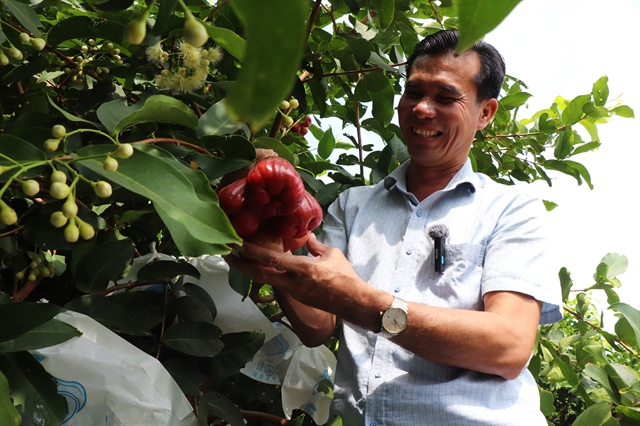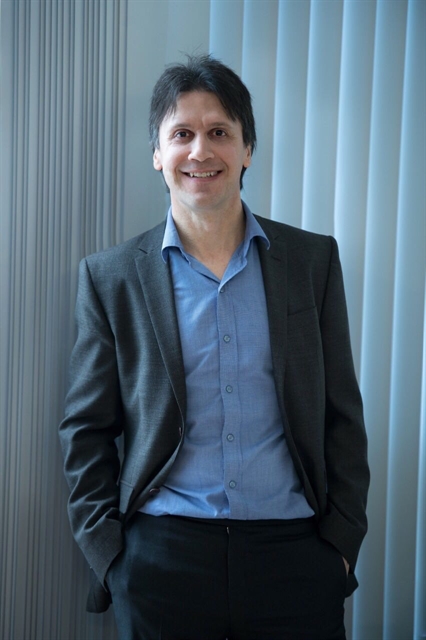 Economy
Economy

 |
| Denis Brunetti, Chairman of Ericsson Việt Nam, Myanmar, Cambodia and Laos. Photo courtesy of Ericsson |
With the potential to digitally transform industries for improved productivity and efficiency, Denis Brunetti, President of Ericsson Vietnam, Myanmar, Cambodia and Laos shares that 5G is a critical national infrastructure that will enable the sustained and inclusive socioeconomic development of Vietnam through science, technology and innovation, further improving Vietnam’s competitiveness in attracting increased high tech FDI and high value investments.
Currently, the digital economy is being promoted by the Vietnamese Government. As a leader of a tech giant like Ericsson who has worked in Vietnam for decades, what do you think about this process?
We've had the pleasure of working with Vietnamese operators in building the 1st 2G network here in 1994 and then 3G in 2010, 4G since 2015, 2016 and now we've done some commercial trials on 5G as well.
Việt Nam is in the top 20 countries in the world with 50 million internet users. While mobile connectivity has helped develop the country so far, 5G will provide the critical infrastructure that will drive the next leg of digital transformation in Việt Nam. Ericsson fully supports and endorses this vision, and we are committed to helping Việt Nam achieve this important and strategic ambition. The next wave of socioeconomic development in Việt Nam will be created through innovation, science and technology, driven by the digital economy
Manufacturing, transport/logistics, energy/utilities, healthcare, and education are sectors that represent huge opportunities for 5G. Coupled with Việt Nam’s National Innovation Centre initiative, the Government’s investment in sustainably growing the nation’s startup ecosystem will significantly contribute to the country’s innovation capacity and the establishment of a thriving digital economy. The Government's target is to have its digital economy contribute 20 per cent and 30 per cent of GDP by 2025 and 2030 respectively.
We believe 5G will pave the way for increased investments in smart manufacturing capabilities in Việt Nam, supporting the government’s focus on driving an increased and sustainable productivity growth rate in Việt Nam. Ericsson is proactively working with mobile service providers to ensure Việt Nam is at the forefront of 5G developments, sharing our technical capabilities as well as our global, regional, and local market insights.
You said that data is the new oil that drives the engine of the economy. So how can 5G and digital transformation impact the performance of some industries such as manufacturing, agriculture, logistics and e-commerce in the future?
We expect two-thirds of the total global manufacturing hubs to be relocating to Asia Pacific by 2030. There are many countries in the world using AI, using augmented reality, virtual reality, digital twin technology, cloud computing, and edge computing together with 5G to make their industries more efficient.
Enterprises worldwide are looking to invest in modernising their legacy systems by utilising new technologies and applications which will drive new innovations, operational efficiencies, and growth. The initial use-case of private 5G networks will be around gaining operational flexibility, efficiencies, and reliability, helping further improve Việt Nam’s labour productivity growth rates towards the Government’s target of 7.5 per cent per annum by 2030
5G also serves as an innovation platform for start-ups. They use 5G to create new tech-led use cases, new companies, new industries, leading to further job creation. Việt Nam has a strong start-up ecosystem, and the Government is putting a lot of investment in start-ups and entrepreneurship. Manufacturing and agriculture, along with retail, fishery, and forestry will also benefit from digital infrastructure.
Clearly, 5G has two-fold benefits to enterprises and industries, making them more efficient and productive, and attracting more investment.
The Vietnamese Government is implementing a plan to increase investment in 5G infrastructure. Could you tell us about Ericsson's contribution to the development of Việt Nam's digital economy?
Việt Nam is one of our priority markets. As mentioned above, we’ve had the pleasure of working with Vietnamese operators in building 2G, 3G, 4G and now 5G as well. We have been helping operators with commercial trials for 5G - Vinaphone, Viettel and Mobifone since late 2020. In fact, our first technical 5G trial was done with Viettel in May 2019.
5G will provide the critical infrastructure that will drive the digital transformation in Việt Nam. Việt Nam is well poised to commercially expand 5G later this year and derive the benefits of our latest, most advanced 5G products and solutions, as well as leverage the valuable knowledge and experiences from the 5G deployment across other markets in the world
5G will pave the way for increased investments in smart manufacturing capabilities in Việt Nam. The growth of the 5G ecosystem will go a long way towards accelerating the 5G and Industry 4.0 adoption by enterprises in Việt Nam. The industry, academia, and government collaboration will serve to build up innovative 5G use cases that are relevant for Việt Nam.
Further, our industry leading Enterprise Wireless Solutions, the Vonage Communications Platform, and our Global Network Platform enables us to offer converged solutions for networks, security, and creating better connections, conversations and engagement for enterprises in Việt Nam, their customers and employees, that are simple to deploy and easy to use.
Additionally, Ericsson adopted a project two years ago to integrate local Vietnamese supplies into our global supply chain. We aim to partner the Vietnamese Government as well and partner them in development of a digital economy in Việt Nam.
Việt Nam is also piloting 5G commercialisation, so which factor should Việt Nam focus on to enable the process?
To enable commercialisation, the government will ensure adequate 5G spectrum availability for service providers, and the mobile operators will need to deploy 5G across the country, establishing a critical national digital infrastructure. We're sharing with the Vietnamese operators our global experience that will help create new industries and new jobs from the vast opportunities emanating from limitless connectivity.
We at Ericsson are proud and dedicated to serve the needs of Việt Nam, working in partnership with all mobile operators and service providers in Việt Nam, as well as academic institutions, to seamlessly expand 5G in the country.
The growth of the 5G ecosystem will go a long way towards accelerating the 5G and Industry 4.0 adoption by enterprises in Việt Nam. The industry, academia, and government collaboration will serve to build up innovative 5G use cases that are relevant for Việt Nam. For example, together with RMIT University in Vietnam, Ericsson is already today delivering 5G, the Internet of Things, AI, automation, AR/VR, edge computing, and blockchain training to RMIT’s engineering, science, and technology students in Việt Nam.
As part of our 30-year anniversary in Việt Nam this year, Ericsson and RMIT University will launch an AI Lab at RMIT campus in the second quarter of 2023, supporting and aligning with the government’s vision of making Việt Nam a regional hub for AI by 2030. This is a particularly important initiative since AI is a spearhead technology for Industry 4.0
Việt Nam is well poised to commercially expand 5G later this year and derive the benefits of the latest, most advanced 5G products and solutions, as well as leveraging the valuable knowledge and experiences from the 5G deployment across other markets in the world. VNS




